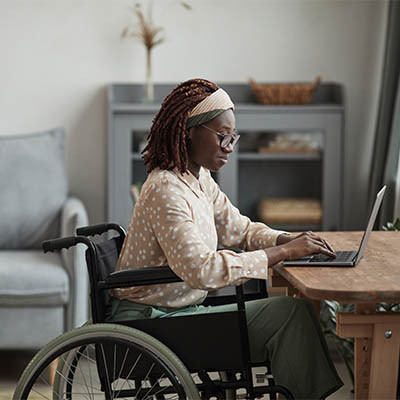
- Home
- About Us
- IT Services
- Managed IT Services
- Security Services
- Cybersecurity
- Cybersecurity Overview
- Network Security
- Business Security
- Unified Threat Management
- Endpoint Security Solutions
- Asset Tracking
- Mobile Device Management
- Email Encryption
- Multi-Factor Authentication
- Spam Protection
- Content Filtering
- Phishing Simulation
- Dark Web Monitoring
- Penetration Testing
- Compliance Standards
- Cloud Computing Services
- Industry Specific
- Data Services
- Hardware Services
- Software Services
- Business Communication
- Understanding IT
- News
- Blog
- Support
- Contact Us
- (217) 428-6449
- Register
- Login
Network Solutions Unlimited Blog
Getting Accessible Internet to the Disabled Isn’t So Easy
Accessibility to the Internet is a hot topic because, at this point, almost everyone should be afforded Internet access. The fact that some people don’t have access to the Internet puts them at a severe disadvantage. One group that has major problems with accessibility are disabled people. Let’s discuss what can be done about that.
The Less Inclusive Internet
We all use the Internet for multiple purposes, and we all get extremely annoyed when we come across a webpage or an app that is poorly designed and provides a terrible user interface. For people with disabilities it can be even more frustrating. In fact, for some, it makes getting the goods and services they desperately need all but impossible to do online.
Defining Accessibility
In the context we mean here, accessibility is basically the usability of a website or app. When people can’t properly navigate, understand, and successfully interact with a web-based platform, its accessibility is limited.
A few standards have been outlined, known by the acronym POUR:
- Content and the overall user interface must be perceivable by everyone, accounting for those who rely primarily on visuals as well as those who require sound or tactile input.
- A website must be operable, which requires that those with limitations must be able to identify and navigate through different elements of a webpage.
- A user must also find the website understandable, with the information presented on it in such a way that the meaning is clear, and the formatting is consistent.
- Finally, a website must be robust, which here means capable of operating properly on a variety of technologies—including assistive technologies.
As the COVID-19 pandemic hit, social distancing guidelines were implemented, making the accessibility of services to people with disabilities extremely important. With everyone thrust into a new system, the inconsistency of the accessibility of applications and websites became frightfully apparent. In America, one-in-every-four people have been diagnosed with some form of disability, so the pandemic made things difficult for nearly a billion people.
Common Disabilities
Here are a few common disabilities that may make it difficult to work with web pages and apps that don’t work:
- Visual disabilities, including blindness, color blindness, and low vision.
- Hearing disabilities, including deafness and hearing impairments.
- Neurological disabilities, including conditions and disorders that impact the nervous system.
- Cognitive disabilities, including those that impact attention, learning, and logic.
- Motor disabilities, including those that limit fine motor skills, slow muscles, or prevent the full use of one’s hands.
These are officially listed in the Web Content Accessibility Guidelines, a standard that was created by the World Wide Web Consortium and specifically designed to establish some basic oversight over the Internet. It became clear that it woefully neglects some people with disabilities. The WCAG has been a foundational guideline for disabled Internet use around the globe. This includes Title III of the Americans with Disabilities Act (ADA), while others (like the European Standard EN 301 549 of the EU Web Accessibility Directive) incorporate the WCAG’s guidelines into its own contents.
While it’s a good start, these guidelines still seemingly come up short.
The pandemic exposed the lack of inclusivity. Take a look at the state unemployment sites. Based on research completed by the Information Technology and Innovation Foundation, 86 percent of these sites failed at least one basic evaluation for mobile loading speed, mobile friendliness, or accessibility.
Additionally, telehealth interfaces, something that has gained a lot of traction during the pandemic, have been exposed for their lack of usability, consistency, and availability of services like closed captioning have underperformed.
Furthermore, a survey conducted by Pew Research Center in 2016 revealed that adults with disabilities were about 20 percent less likely to own the technology needed, which is either a computer or mobile device, and the at-home broadband connectivity needed to run these platforms as many disabled people are living on a fixed budget and don’t have the resources to purchase these goods and services.
It is going to be extremely important, with social distancing likely extending into 2022, that more is done to provide disabled people with the accessibility to technology they require for certain situations. Of course, web-based applications and websites are crucial to a lot of people, not just the disabled. Education, healthcare, financial services, and more have to do more to make their applications usable for people as they depend on them during this difficult time.
Have you had difficult experiences with technology in the last year? What do you think should be done about the lack of accessibility to easy-to-use applications and web interfaces? Leave your thoughts in the comments section below and check back at our blog soon for more great technology content.
About the author
Frank Saulsbery began a career in technology 1998 ago after studying microelectronics in college, he now owns two technology companies, sits on several advisory boards and is requested to speak regularly on cyber security awareness and digital business protection.
Latest News & Events
Account Login
Contact Us
Learn more about what Network Solutions Unlimited can do for your business.
(217) 428-6449
3090 N Main St
Decatur, Illinois 62526

Comments